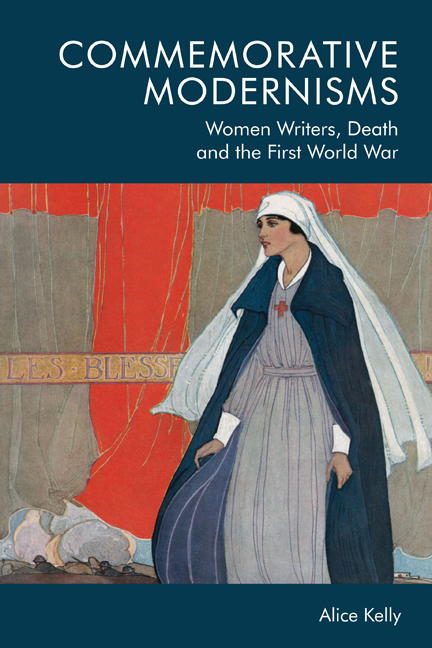Book contents
- Frontmatter
- Contents
- List of Figures
- Acknowledgements
- Dedication
- Introduction: A Culture Surcharged with Death
- Part One Death in Proximity: Wartime Commemorations
- Part Two Grief at a Distance: Civilian Modernisms
- Part Three Modernist Death: Postwar Remembrance
- Conclusion: Modernism’s Ghosts
- Bibliography
- Index
3 - Mansfield Mobilised: Katherine Mansfield, the Great War and Military Discourse
Published online by Cambridge University Press: 15 October 2020
- Frontmatter
- Contents
- List of Figures
- Acknowledgements
- Dedication
- Introduction: A Culture Surcharged with Death
- Part One Death in Proximity: Wartime Commemorations
- Part Two Grief at a Distance: Civilian Modernisms
- Part Three Modernist Death: Postwar Remembrance
- Conclusion: Modernism’s Ghosts
- Bibliography
- Index
Summary
Bulletin du Front:
I advanced to the consul and gained a local success, taking the trench as far as Paris. I expect to advance again under cover of gas on Saturday. The enemy is in great strength but the morale of the Wig is excellent. Please explain this to Ribni & make him salute.
Prefacing a letter to her partner and soon-to-be husband John Middleton Murry on her arrival in Paris in March 1918, Katherine Mansfield's mock ‘Bulletin du Front’ demonstrates the permeation of her personal correspondence by military discourse. Having been in Bandol in the south of France since January 1918 for her health, Mansfield had become stranded in Paris during a three-week bombardment by the German Superkanon nicknamed ‘Big Bertha’ in March and April 1918, and she depicts her journey back to Murry in London in terms of military manoeuvre. Her explicit usage of war terminology and the mock bulletin heading demonstrate that Mansfield was very consciously parodying military reportage, while her comment about Ribni, one of her dolls, suggests the lighthearted tone of this text, intended solely for entertainment. The letter's conclusion – ‘Now I must go back to the trenches & go over the top to the station – Goodbye – breathlessly with all my lovely heart’ – demonstrates the combination of military rhetoric with the language of sentimentalism in Mansfield's war writing: a curious hybrid in which the noncombatant has made combatant language a means of modernist experimentation.
My first two chapters examined proximate or intimate encounters with the war dead, which tended to use more traditional motifs and sites such as the deathbed and the graveyard in order to represent the dead, even if these were eventually proved inadequate. The second section of this book examines the more abstract modes used by civilian writers to depict the war and the war dead. These writers’ metaphorical or physical distance from the war typically facilitated their literary experimentation with different modes of representation.
This chapter analyses how Mansfield appropriated military discourse at different stages in her personal correspondence, as a female civilian modernist writer, who – unusually – lived in France and Italy and travelled in the war zones, but remained at a distance from the war. She wrote: ‘We are so near – really – Paris – London its nothing & yet between us there are swords & swords – ‘.
- Type
- Chapter
- Information
- Commemorative ModernismsWomen Writers, Death and the First World War, pp. 121 - 153Publisher: Edinburgh University PressPrint publication year: 2020



